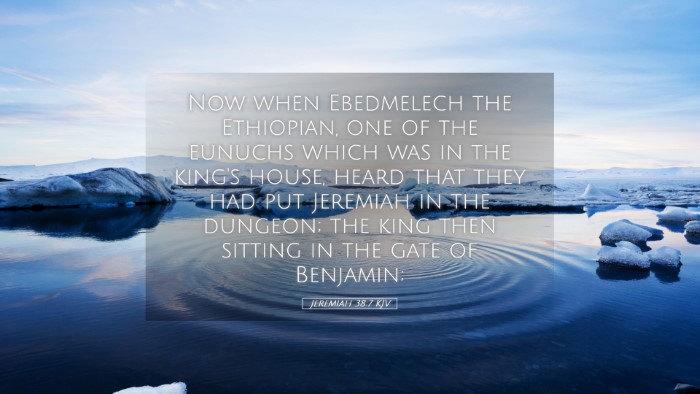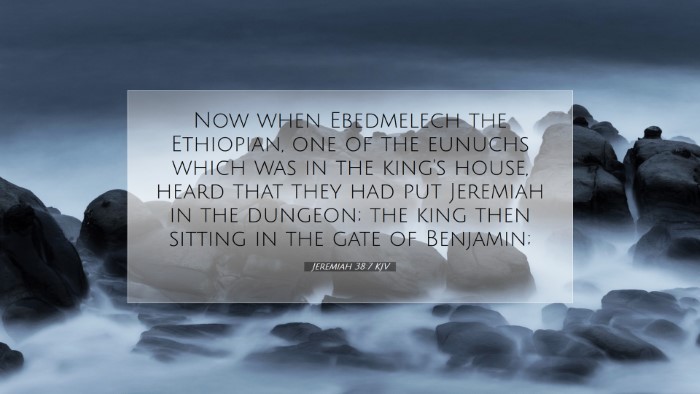Commentary on Jeremiah 38:7
Verse: "But Ebed-melech the Ethiopian, one of the eunuchs who was in the king's house, heard that they had put Jeremiah into the dungeon; and the king was sitting at the Gate of Benjamin."
Introduction
The verse in question highlights a pivotal moment in the narrative of Jeremiah where an unexpected hero emerges in the form of Ebed-melech, a servant of the court. This commentary will explore the implications of Ebed-melech's actions, the socio-political context, and the theological significance of this passage.
Contextual Background
Jeremiah, known as the weeping prophet, faced tremendous opposition in his ministry. The backdrop of this verse is the tumultuous period during the siege of Jerusalem by the Babylonians. The prophet's messages of impending judgment were met with hostility, leading to his imprisonment. Understanding the historical setting in which Ebed-melech acts is crucial in grasping the weight of his intervention.
Ebed-melech: An Unlikely Advocate
Ebed-melech, identified as an Ethiopian eunuch, serves in the royal court. His ethnicity and status shape the narrative, signifying that God's concern extends beyond Israel to a foreign servant willing to act with compassion. Matthew Henry notes that "though he was a stranger, he was God's servant." This introduces a vital theme of divine sovereignty and inclusion, showing that God’s grace can operate through unexpected vessels.
The Boldness of Ebed-melech
In the face of oppression, Ebed-melech shows remarkable courage. He hears of Jeremiah's plight and acts decisively. Albert Barnes emphasizes that “he boldly intercedes for Jeremiah,” indicating that his actions were not just driven by concern for the prophet but also a moral obligation. The eunuch’s willingness to confront the king underscores a profound quality: moral integrity outweighing societal norms.
The Role of the King's Gate
The mention of the king sitting at the Gate of Benjamin places this incident in a position of importance. The gate was a place of authority where judgments were made, and Ebed-melech's approach here is significant. Adam Clarke points out that “his position at the gate denotes that he had access to the king’s ears,” hinting that his role was not just that of a passive observer but an active participant in the court’s politics.
Consequences of Advocacy
The act of speaking up for Jeremiah not only demonstrates Ebed-melech’s bravery but also reflects on the nature of true advocacy, which often comes with risks. As Ebed-melech takes this initiative, it raises critical questions for contemporary believers regarding the cost of standing up for the oppressed. The implications are far-reaching in ecclesiastical practices today, emphasizing that the voice of the marginalized must be heard and met with action.
Theological Insights
This passage serves as a notable reminder of God’s providence. The actions of Ebed-melech integrate themes of hope and redemption within the narrative of despair that pervades Jeremiah. Theologically, his intercession can be seen as a type reflecting Christ’s advocacy for humanity—acting with compassion and rescuing those in bondage. Matthew Henry’s insight that “the God of grace often makes use of the most unlikely persons to do great things” resonates deeply, recognizing that God’s workings sometimes transcend our understanding of capability and context.
Lessons for Modern Believers
- Courage in Advocacy: Ebed-melech exemplifies the necessity of courage in advocacy, urging believers to take a stand against injustice.
- Divine Sovereignty: The relationship between Ebed-melech and the fate of Jeremiah illustrates how God orchestrates the lives of individuals for His purpose, showing that He can use anyone to fulfill His plans.
- The Value of Intercessory Action: Ebed-melech’s proactive stance serves as a model for intercessory prayer and action within the community of faith, urging believers to be advocates for those who cannot speak for themselves.
Conclusion
Jeremiah 38:7 is a poignant reminder of the radical inclusivity and providence of God. Through Ebed-melech, a foreign servant, we see the heart of God for His people, regardless of status or background. As individuals who follow Christ, may we reflect on the courageous example of Ebed-melech and be inspired to advocate for justice and mercy in a world still filled with adversities.


